
Cihan Geyik
Go To Market
5
min read
Apr 25, 2025
Top 10 Zoominfo Alternatives & Competitors - B2B Sales for 2025
In today's highly competitive B2B landscape, equipping your sales and marketing teams with the right intelligence isn't just an advantage – it's essential for survival and growth. For years, ZoomInfo has been a dominant player, offering a vast B2B database and a suite of tools designed to streamline Go-To-Market (GTM) motions, from lead generation to understanding buyer intent. Its comprehensive platform serves countless sales, marketing, and operations professionals globally.
However, the sales intelligence market is dynamic, and what works perfectly for one company might not be the ideal fit for another. Many businesses actively seek ZoomInfo alternatives due to factors like specific feature requirements (e.g., stronger Account-Based Marketing capabilities, unique AI automation), budget constraints, data accuracy concerns in specific regions, usability preferences, or the need for better integration with their existing tech stack. As we look towards 2025, the sophistication and specialization of GTM platforms continue to increase, offering powerful options tailored to diverse needs.
Why Trust This Guide?
This guide moves beyond a simple list. We've analyzed the market based on factors like feature sets, data quality claims, user reviews (drawing insights from platforms like G2, Capterra, and direct user feedback where available), pricing models (including publicly available data and insights from sources like Vendr where noted), and unique value propositions compared to ZoomInfo. Our goal is to provide an expert, unbiased overview to help you make an informed decision based on demonstrated capabilities and real-world considerations. We aim to empower you with the knowledge needed to select the platform that best aligns with your strategic objectives and operational realities.
Top 10 ZoomInfo Alternatives & Competitors
Empler AI
Focus: An Agentic Automation Platform for GTM, using collaborative AI agents to automate complex, multi-step workflows beyond standard data tasks.
Key Features: Utilizes "AI Agent Teams" for autonomous task execution (e.g., trigger-based prospecting, competitor monitoring, advanced enrichment, content generation), includes own database (~1B professionals, ~60M companies), integrates widely (CRMs, data sources like Apollo, outreach tools, LLMs) without needing separate API keys for many, offers workflow templates.
Ideal User: Innovative GTM teams looking to automate sophisticated, multi-tool workflows that traditional sales intelligence or engagement platforms cannot handle natively.
Pricing Insight: Offers tiered pricing starting at $99. The other plans are $499, $1999, and Custom Plans.
Strengths: Unique approach using AI agents to automate complex, previously manual GTM tasks; includes its own data, potentially reducing reliance on third-party credits within workflows; broad integration capability.
Considerations: As a newer approach focused on agentic automation, understanding its practical application and ROI for specific complex use cases requires careful evaluation via demos or trials. It tackles different problems than standard contact databases.
Key Differentiator vs. ZoomInfo: Focuses on automating complex Agentic GTM workflows using AI agents, rather than primarily providing a searchable database and basic engagement tools. It aims to orchestrate tasks across multiple data points and tools. It provides more credits on plans.
6sense
Focus: Primarily an Account-Based Marketing (ABM) platform using AI to uncover anonymous buying signals and predict purchase timing.
Key Features: AI-driven intent data analysis (website, third-party research), predictive scoring ('RevenueAI'), anonymous visitor identification ('6signal Graph'), AI-guided 'Next Best Actions', integrated ad campaign tools.
Ideal User: Mid-market to enterprise B2B marketing and sales teams prioritizing a data-led ABM strategy, especially those targeting high-value, complex sales cycles.
Pricing Insight: Offers a limited free plan. Paid plans require custom quotes. Vendor data suggests a median annual contract value (ACV) around $97,000, indicating an enterprise focus.
Strengths: Powerful predictive analytics for identifying in-market accounts early; strong focus on orchestrating ABM plays; relatively quick implementation reported by users.
Considerations: Predictive accuracy can depend on the visibility of account activity online; some users note limitations in sales-specific reporting features compared to dedicated sales intelligence tools.
Key Differentiator vs. ZoomInfo: Deeper focus on predictive ABM and uncovering anonymous intent signals, whereas ZoomInfo offers a broader GTM suite with a larger contact database focus.
Apollo.io
Focus: An integrated sales intelligence and engagement platform combining a large B2B contact database with outreach automation.
Key Features: Extensive database (~275 M+ contacts), AI-powered email/call/LinkedIn sequences, sales call analysis AI, customizable lead scoring, broad CRM/sales tool integrations.
Ideal User: B2B sales teams (SMB to Enterprise) seeking an all-in-one solution for finding prospects and engaging with them within a single platform. Popular in SaaS and professional services.
Pricing Insight: Free trial available. Paid plans start around $49/user/month (billed annually). Vendor data indicates a median ACV near $17,000 for business plans, suggesting accessibility for mid-market.
Strengths: Combines data and engagement, potentially reducing tool stack complexity; robust filtering for list building; AI features enhance workflow efficiency.
Considerations: Credit limits on lower tiers can be restrictive for high-volume outreach; user reviews occasionally mention variable customer support experiences.
Key Differentiator vs. ZoomInfo: Tighter integration of a large database with native sales engagement (sequencing) tools at potentially more accessible price points for some tiers.
LeadIQ
Focus: Streamlined B2B prospecting tool emphasizing finding contact data (especially via LinkedIn) and simplifying outreach preparation.
Key Features: Chrome extension for LinkedIn Sales Navigator data capture, CRM/Sales Engagement integrations (Salesforce, HubSpot, Salesloft, Outreach), sales trigger alerts (job changes, news), CRM data enrichment.
Ideal User: Sales teams in SMBs and mid-market companies, particularly those heavily reliant on LinkedIn prospecting and needing a simple, efficient workflow.
Pricing Insight: Free plan with limited credits. Paid annual plans range from ~$39 to $79/user/month. Vendor data shows a median ACV around $34,000 for business customers.
Strengths: Praised for ease of use and seamless LinkedIn integration; helps maintain data hygiene within connected CRMs.
Considerations: Database size and feature depth may be less extensive than larger platforms; list size limitations noted by some users.
Key Differentiator vs. ZoomInfo: Strong focus on simplifying the individual salesperson's workflow, especially capturing data from LinkedIn, rather than offering ZoomInfo's broader company-level intelligence and analytics suite.
Cognism
Focus: Premium sales intelligence platform emphasizing high-quality, globally compliant (GDPR/CCPA) B2B data, particularly phone-verified mobile numbers.
Key Features: Strong EMEA & APAC data coverage, "Diamond Data®" (phone-verified mobiles), intent data integration (via Bombora), Chrome Extension, scheduled CRM data enrichment.
Ideal User: Mid-market and enterprise GTM teams where data accuracy, global compliance (especially Europe), and reliable direct-dial mobile numbers are paramount.
Pricing Insight: Custom pricing, generally positioned for the mid-market and enterprise segments. Not typically suited for very small businesses due to cost.
Strengths: High reputation for data quality and accuracy, particularly mobile numbers; strong commitment to compliance; responsive customer support is often cited.
Considerations: Premium pricing can be a barrier for smaller companies; the database size might be smaller than ZoomInfo's overall, but potentially higher quality in covered areas.
Key Differentiator vs. ZoomInfo: Emphasis on verified mobile data quality and stringent global compliance, particularly valuable for teams struggling with connect rates or operating heavily in GDPR-regulated regions.
Lusha
Focus: User-friendly sales intelligence tool for finding B2B contact information, enhanced with intent data and basic engagement features.
Key Features: Browser extension and web app, advanced search filters (intent, job changes, tech usage), list enrichment, simple interface, CRM/sales tool integrations.
Ideal User: Sales, marketing, RevOps, and recruiting teams, especially in SMBs and growth-stage companies needing an easy-to-use prospecting tool.
Pricing Insight: Free plan with limited credits. Paid annual plans range from ~$36 to $59/user/month. Vendor data suggests a median ACV of around $15,000 for business contracts.
Strengths: Known for its simplicity and ease of adoption; multi-step data verification process aims for accuracy.
Considerations: Some users find search filter granularity less comprehensive than competitors; credit-based costs can escalate with heavy usage.
Key Differentiator vs. ZoomInfo: Primarily focused on ease of use and contact finding, often at a lower entry price point, making it accessible for smaller teams or those with simpler needs.
Clearbit (now Breeze Intelligence, part of HubSpot)
Focus: Data enrichment and sales intelligence platform, now deeply integrated into the HubSpot ecosystem, aimed at creating unified customer profiles.
Key Features: Real-time enrichment (~100+ data points), anonymous website visitor identification, seamless HubSpot CRM integration, global B2B data, focus on identity resolution.
Ideal User: B2B sales and marketing teams heavily invested in HubSpot, needing robust data enrichment and website visitor intelligence to enhance their CRM data.
Pricing Insight: Pricing plans are custom. Vendor data indicates a median ACV of around $36,000. A free plan exists for basic enrichment.
Strengths: Excellent for enriching HubSpot data and identifying website traffic; effective for managing large contact databases within the HubSpot environment.
Considerations: Recent UI changes post-acquisition have drawn mixed user feedback; credit system or enrichment relevance outside core firmographics can be limitations. Its strength is more in enriching known contacts/accounts than cold list building.
Key Differentiator vs. ZoomInfo: Deep, native integration with HubSpot and primary focus on enrichment and website intelligence rather than being a standalone, broad prospecting database like ZoomInfo.
Demandbase
Focus: An end-to-end Account-Based Experience (ABX) platform unifying account identification, intent monitoring, cross-channel engagement, and measurement.
Key Features: Combines first-party and third-party intent data, granular audience segmentation, AI-driven account intelligence (fit, intent scoring), website/ad/email personalization, anonymous visitor identification, integrated ABM/ABX workflow.
Ideal User: Mid-market and enterprise B2B organizations seeking a comprehensive, integrated platform to manage their entire ABM/ABX strategy, from identification to engagement and measurement.
Pricing Insight: Custom pricing, reflecting its comprehensive nature and enterprise target market.
Strengths: Offers a holistic ABM solution, potentially replacing multiple point solutions; superior data integration capabilities (1st/3rd party); highly customizable segmentation and scoring.
Considerations: Can be complex to implement fully due to its breadth; typically requires a significant investment.
Key Differentiator vs. ZoomInfo: Provides a more integrated end-to-end ABM/ABX platform encompassing data, intent, engagement orchestration, and measurement, whereas ZoomInfo is primarily a data/intelligence provider with added engagement features.
Hunter
Focus: Primarily an email outreach platform focused on finding and verifying professional email addresses, with added cold campaign features.
Key Features: B2B email database, Email Finder & Verifier tools, cold email campaign management, basic intent data filters, integrations (CRMs, Chrome, Gmail, Sheets).
Ideal User: SMBs, startups, and specific teams (sales, marketing, recruiting) heavily reliant on cold email outreach as a primary GTM channel.
Pricing Insight: Free plan for limited use. Paid annual plans range from ~$34 to $349 per month, offering scalable options.
Strengths: Simple, effective, and often cost-effective for email-centric prospecting; allows saving ICP searches for ongoing lead flow.
Considerations: Company-level data and non-email contact information are less comprehensive than broader platforms; data coverage may be less robust outside North America/Europe.
Key Differentiator vs. ZoomInfo: Laser-focused on finding and verifying email addresses and facilitating email campaigns, rather than ZoomInfo's broader company/contact intelligence scope, including direct dials, org charts, and deeper intent data.
Seamless.AI
Focus: Positions itself as a real-time search engine for B2B contact information, incorporating buyer intent data and AI writing assistance.
Key Features: Real-time AI-powered contact data search, job change tracking, buyer intent data features, and an AI writing assistant for outreach.
Ideal User: Sales teams prioritizing real-time data discovery over potentially curated, static databases.
Pricing Insight: Operates on a credit-based system; specific pricing requires direct consultation.
Strengths: The real-time search capability is a unique selling proposition, potentially finding very current information.
Considerations: Numerous user reviews across platforms (G2, Capterra) frequently raise significant concerns about inconsistent data accuracy, aggressive sales tactics, and challenges with customer service, billing transparency, and auto-renewal policies. Thorough due diligence, a careful trial, and scrutiny of contract terms are strongly advised.
Key Differentiator vs. ZoomInfo: Claims a real-time search approach versus ZoomInfo's large, regularly updated (but potentially less real-time) database. However, potential data quality and business practice concerns require careful evaluation.
Conclusion: Choosing the Right ZoomInfo Alternative for 2025
Selecting the optimal sales intelligence platform is a strategic decision with significant implications for your revenue engine. While ZoomInfo remains a formidable force, the diverse landscape of alternatives provides compelling options tailored to specific needs, budgets, and GTM strategies.
Your "best" choice hinges on self-assessment:
Primary Goal: Are you focused on raw contact data volume (like ZoomInfo often provides), high-fidelity verified data (Cognism), integrated prospecting and engagement (Apollo.io, Lusha), sophisticated ABM orchestration (6sense, Demandbase), deep HubSpot enrichment (Clearbit), simplifying LinkedIn prospecting (LeadIQ), email-centric outreach (Hunter), real-time discovery (Seamless.AI - with caveats), or automating complex workflows (Empler AI)?
Data Needs: Prioritize accuracy, specific geographic coverage (e.g., EMEA focus with Cognism), compliance (GDPR/CCPA), or specific data points (like verified mobiles or intent signals)?
Integration Ecosystem: How critical is seamless integration with your existing CRM (e.g., HubSpot for Clearbit), sales engagement platforms, or marketing automation?
Budget & Pricing Model: Does a per-user model, credit-based system, or custom enterprise contract align better with your expected usage and financial constraints? Scrutinize contract terms.
Team & Usability: How steep is the learning curve? Is ease of use paramount (Lusha, LeadIQ), or is your team ready for a more complex, powerful platform (Demandbase, 6sense)?
Unique Features: Are specific capabilities like predictive analytics, agentic automation, phone-verified mobiles, or real-time search non-negotiable?
By carefully weighing these factors against your unique business requirements, you can confidently select a ZoomInfo alternative or competitor that will provide the intelligence and capabilities needed to fuel your sales success in 2025 and beyond.
Sources
Vendr SaaS Trends: https://www.vendr.com/blog/zoominfo-competitors-alternatives (Provides aggregated contract value insights)
Demandbase Blog: https://www.demandbase.com/blog/6sense-vs-zoominfo/ (Comparative insights, albeit from a competitor)
Empler AI Blog & Website: https://www.empler.ai/blog/top-10-clay-alternatives-competitors-b2b-sales-for-2025 & https://www.empler.ai/ (Insights on newer automation approaches)
User Review Platforms: Aggregated insights from G2.com, Capterra.com, TrustRadius.com (Used for assessing Strengths & Considerations)
Official Product Websites: For feature lists and general positioning (Accessed for each listed tool).







